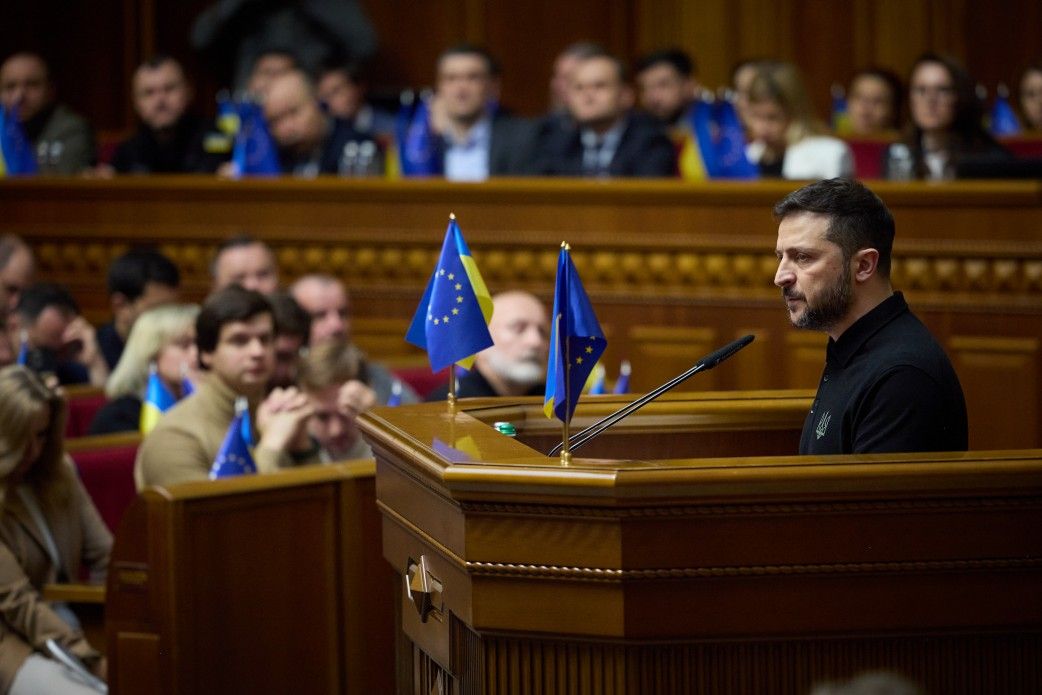Zelensky's victory plan has 'great agenda' but practical steps unclear, MPs say

Ukrainian lawmakers voiced their first reactions to President Volodymyr Zelensky's presentation of Ukraine's victory plan to parliament on Oct. 16, praising the overall agenda but calling out the supposed lack of practical steps.
Some opposition lawmakers criticized it for being too vague and relying too much on international partners while omitting domestic issues, such as pro-democratic and anti-graft reforms that they say are key to Ukraine’s success and important in achieving NATO membership.
The victory plan includes five points: an invitation to join NATO, a defense aspect, a non-nuclear deterrence against Russian aggression, an economic aspect, and a post-war security architecture. Three addenda remained classified but have been shared with Western partners.
Zelensky pitched the plan to the leaders of the U.S., the U.K., Germany, France, and Italy in an effort to drum up support before the uncertain U.S. presidential elections. The proposal has been kept mostly secret from the public until now.
Roman Lozynskyi, a lawmaker formerly from the opposition Holos (Voice) party, wrote on Facebook that the plan has a "great agenda," but the actual steps to achieve them remain unclear.
"On one hand, the victory plan sounds like a fantasy. On the other hand, so did the Patriots, Storm Shadow, the F-16s, sinking a chunk of the (Russian) Black Sea Fleet, and controlling part of Kursk Oblast."
Lozynskyi stressed that everything now rests "on the decisions of partners and the success of our diplomacy" as well as on the unity among the Ukrainian leadership and the opposition.

In presenting the plan to parliament, Zelensky said it is “a plan to strengthen our state and our position. To be strong enough to end the war. To make sure that Ukraine has all its muscles.”
"This plan can be implemented. It depends on our partners. I emphasize: on partners. It definitely does not depend on Russia," Zelensky said.
Lozynskyi also said that Zelensky did not explain, however, how he plans to implement the plan’s various points, adding that it may not be wise to make these steps public.
Yaroslav Yurchyshyn from the Holos party highlighted that the victory plan has been agreed upon with the Ukrainian military command and is being coordinated with Western partners.
“I have no doubt that many people have ideas and comments on what and how to improve it. However, for me… the best criticism is action.”
Oleksii Honcharenko, a lawmaker from the opposition European Solidarity party led by former president Petro Poroshenko, criticized the plan for supposedly relying too much on outside assistance without requiring steps from the Ukrainian leadership.
"Where is the clause on the fight against corruption, on strengthening our democratic institutions?" Hocharenko wrote on Telegram.
The lawmaker described the plan as "empty words" that are "removed from reality."
Honcharenko's party colleague, Iryna Herashchenko, praised the plan's general goals but also criticized its focus on international support, noting that the word "partners" has been used more often than "Ukraine" and "Russia."
She also pointed out the absence of "homework" Ukraine needs to do to achieve these goals, such as anti-corruption reforms that are a necessary step for NATO membership.
"I wonder why the president has come to parliament now? For me, this is a signal of the seriousness of the situation at the front, in the economy, of the shift on the global stage," the lawmaker said.
"The return of the borders of 1991... is no longer heard... (but) the fact that certain territories may have to be liberated through political, diplomatic measures was also not heard."
A third European Solidarity lawmaker, Mykola Kniazhytskyi, presented a less scathing commentary.
“The most important thing (Zelensky) said was… that Ukrainian troops could replace, in particular, American troops in Europe, partners' troops, because they have experience," the lawmaker told the Kyiv Independent.
According to Kniazhytskyi, the presentation of Zelensky's victory plan may play a role in the upcoming U.S. election.
“The themes voiced by President Zelensky will obviously be used by Democrats in the presidential campaign. It will be difficult for the Republicans to object to them... That is, it can be used by both parties in the U.S,” Kniazhytskyi said.
“If this plan is agreed with Western allies, I'm (fully in support of the plan). If they are not ready for it, and he is only talking about it for the sake of PR, then it will be a big disappointment.”
Unlike some opposition lawmakers, the parliamentary leader of Zelensky's Servant of the People party praised the plan as a "very detailed document" offering Kyiv's partners a "strategy of mutual reinforcement."
"Without our victory, without an honest and fair peace for Ukraine, the world will not be able to feel safe," David Arakhamia said on Telegram.
"But a strong, independent, and European Ukraine will be able to contribute to the collective security of the entire continent," Arakhamia commented, highlighting Kyiv's role in the plan.
The top lawmaker from Zelensky's party also revealed that after the presentation, the president held a meeting with parliamentary leaders. Arakhamia told the Kyiv Independent on Oct. 15 that the classified parts of the plan would be shared only with the parliamentary leadership.
As Ukrainian lawmakers react to the victory plan, Western partners have remained mostly tight-lipped. The U.S. State Department said diplomatically that the proposal includes "a number of productive steps," though some partners were reportedly "unimpressed" with the plan.
Several Western officials believe it leans too heavily on additional arms supplies and on lifting restrictions on their use and does not bring many new ideas to the table, the Wall Street Journal reported in September.















